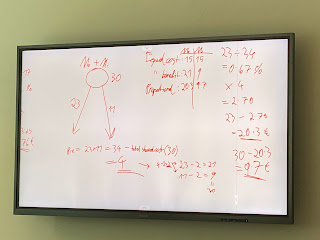Cross-Cultural Training Session 5 and 6
At the beginning of the first session of class, we continued from last class's preparation of the visit to China and how power distance and hierarchy would affect the negotiations. Factors like individualism and collectivism can also influence your behavior in China as it is better to show up in a group and do activities as a group. Other factors like masculinity can also be taken in consideration, you should show manners and give respect, of course, but you should establish first a relationship based on common interests. Long-term orientation of China is 87, which means they are more pragmatic and eager to find solutions to problems. Uncertainty avoidance in China is 30, which basically means that they are not having alot of regulations and more open to accepting unstructured situations or changeable environments. Indulgence vs. Restraint in China is 24, which means it is a restraint society, which means it is better to fit it rather than stand out and they are much more formal. Thus, meetings should be personal, you should go take them at the airports, have greetings from people of the same or higher title, welcome them with as many people that is coming, excuse yourself respectfully and be able to replace someone with the same status and be respectful.
In a situation where a disagreement happened and tasks weren't executed on time. Give them time, discuss how tasks are performed and what they would propose who is going to do what and then, you can negotiate.
In a situation where you are being shared confidential information about others and you feel uncomfortable whether they are sharing your information with others. In that case, in-groups are very important and you should approach it at your own discretion. In-group? yes. Rely? no. Able to depend? Common agreement on what can be shared or falsified information. But, if it is not in your company culture, you should reject that information and say that it is not in the contract to be able to do so. Find a solution so that both parties won't lose face.
In the second session of the class, we spoke a bit about expatriates and schools and the stages they go through when they move to work in another country, especially when the cultural distance is high. When the expats come back home, re-integration shock happens. Expats are the ones going from the headquarter to one of the foreign markets. The Inpats are the ones coming from foreign markets to the headquarter. A Transpat is someone who goes from one of the foreign market to another foreign market. Monocentric hiring is hiring people only from Switzerland. Polycentric hiring means that you are open to hiring people from a limited number of foreign countries. Geocentric approach would be that you are going to hire from all over the world, independent of who they are and where they are from.
We did a case study of an Australian manager in a US American company. The workforce hierarchy in the United States has multiple steps, starting with Directors at the top and ending with the labor force at the bottom. As a result, there is a significant gap in hierarchy levels and power distance between managers and their subordinates. The communication difficulties are caused by these two causes. The higher the number of layers in a hierarchy, the more likely a message may be corrupted as it travels from top management to workers at the bottom, resulting in communication loss/gap. Employees are also not supposed to interrupt their superiors when they are delivering their viewpoint, as we see in the case of GOC. They did not take the lead during the group debate and instead became uncomfortable. This management approach protects top managers by allowing them to advise whatever they want to top management without regard for their staff. This organizational method has a number of negative consequences:
•employees lack leadership qualities because they never get chances to take initiatives.
•too formal structured organisations resist innovation because employees are following same schedule everyday and no one asks for their opinion about potential changes to the workplace and work practices.
•lack of flexibility, such organisational structures are rigid and lack flexibility which resist adaptability.

Comments
Post a Comment